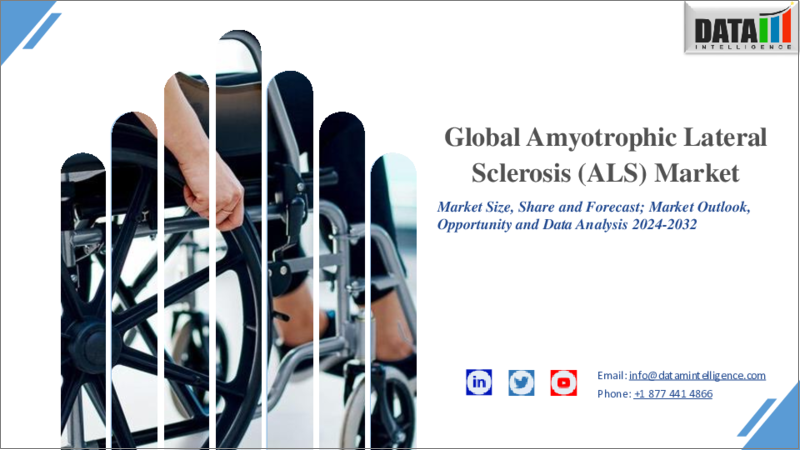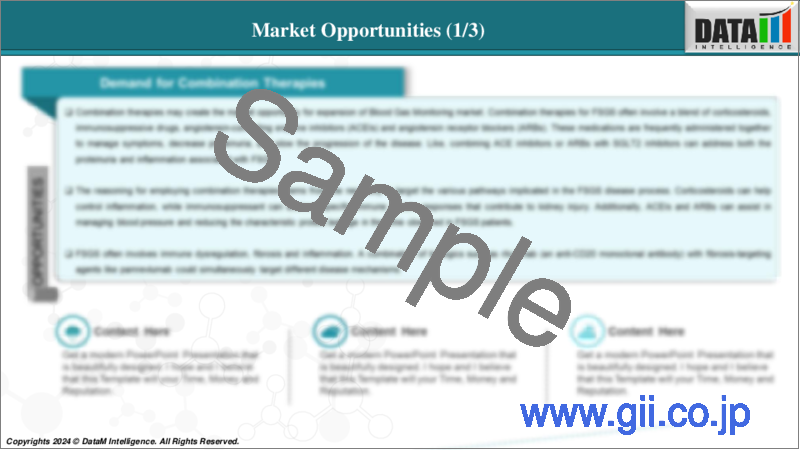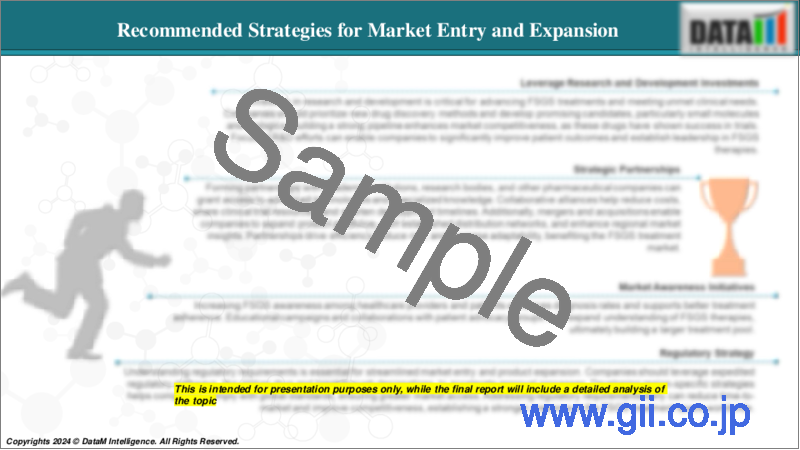|
|
市場調査レポート
商品コード
1304545
筋萎縮性側索硬化症(ALS)の世界市場-2023年~2030年Global Amyotrophic Lateral Sclerosis (ALS) Market - 2023-2030 |
||||||
カスタマイズ可能
適宜更新あり
|
|||||||
| 筋萎縮性側索硬化症(ALS)の世界市場-2023年~2030年 |
|
出版日: 2023年07月07日
発行: DataM Intelligence
ページ情報: 英文 195 Pages
納期: 即日から翌営業日
|
- 全表示
- 概要
- 目次
市場概要
筋萎縮性側索硬化症の世界市場規模は2022年に7億米ドルに達し、2030年には10億米ドルに達するなど、有利な成長が予測されています。世界の筋萎縮性側索硬化症市場は、予測期間中(2023-2030年)に5.1%のCAGRを示すと予測されています。進行中の研究努力と新薬の臨床試験の増加が、筋萎縮性側索硬化症市場動向の需要を押し上げています。
ALS市場には、エダラボン(ラディカバ)やリルゾールなどのFDA承認薬を含むさまざまな治療法があり、機能的能力の低下を遅らせる効果が実証されています。さらに、支持療法的介入、補助器具、集学的ケアは、症状を管理し患者の転帰を最適化する上で重要な役割を果たしています。
世界の筋萎縮性側索硬化症市場は、筋萎縮性側索硬化症の有病率の上昇、認知度の向上、研究開発活動の進展、治療選択肢の技術的進歩などの要因によって牽引されています。
市場力学
研究開発の進展が筋萎縮性側索硬化症市場の成長を牽引
研究開発の進展は、筋萎縮性側索硬化症(ALS)市場の成長を促進する上で極めて重要な役割を果たしています。ALSの根本的なメカニズムの解明、潜在的な治療標的の特定、革新的な治療アプローチの開発を目指した研究開発は、ALS治療の状況を一変させる可能性を秘めています。
現在進行中の研究開発では、ALSに対する様々な治療アプローチが模索されています。これには、低分子薬剤、遺伝子治療、幹細胞を用いた治療、その他の革新的な治療法の開発が含まれます。新薬や治療戦略の発見と開発は患者に希望を与え、利用可能な治療選択肢を拡大することで市場の成長を促進します。
例えば、2022年9月29日、筋萎縮性側索硬化症(ALS)、筋力を低下させる神経系疾患を治療する経口新薬「トラステッドソース」が食品医薬品局(FDA)に承認されました。
認知度の向上も筋萎縮性側索硬化症市場の成長を牽引
筋萎縮性側索硬化症の症状、危険因子、医療機関への受診の重要性に関する認識が高まることで、早期診断が可能になります。早期診断により、タイムリーな介入と適切な治療の開始が可能となり、症状の管理と患者の転帰の改善に役立っています。認知度向上キャンペーンや教育的イニシアチブはALSに対する人々の意識を高め、より積極的にヘルスケアを求める行動やケアへのアクセスの改善につながります。
ALSに対する社会的認知が高まることで、研究活動への関心や支援が生まれます。ALSという病気とその影響に対する一般市民の理解が深まるにつれて、個人、慈善団体、政府機関はALSの研究に資金を提供するようになります。資金が増加することにより、科学の進歩が加速され、共同研究が促進され、この分野に才能ある人材が集まるようになり、最終的には新しい治療法や治療アプローチの開発が促進されます。
高額な治療費が市場の成長を妨げる
エダラボン(ラジカヴァ)やリルゾールなど、FDAが承認しているALS治療薬は高額です。これらの薬剤はしばしば長期間の使用が必要とされ、患者やヘルスケアシステムの経済的負担を増大させる。薬剤費が高額であるため、入手しやすさや購入しやすさが制限され、患者の治療レジメンへのアドヒアランスが阻害され、市場の成長が阻害される可能性があります。
ALS治療の高額な費用は、ヘルスケアシステムや保険会社に経済的負担を強います。薬代、入院費、専門的ケア、サポートサービスなどにかかる費用はヘルスケア予算を圧迫します。そのため、償還の問題、保険適用の制限、治療へのアクセスの制限などが生じ、市場の成長を阻害しています。
COVID-19の影響分析
COVID-19の流行は筋萎縮性側索硬化症市場に大きな影響を与えました。パンデミックは世界中のヘルスケアシステムに混乱をもたらし、COVID-19患者の管理と治療に重点が移されました。ALS患者の定期検診や経過観察など、必要でないヘルスケアサービスが遅れたり中止されたりすることで、ケアへのアクセスが影響を受け、疾病管理に影響を及ぼす可能性があります。
ALSに関連する多くの進行中の臨床試験や調査研究が、パンデミックのために一時的に中止されたり、遅延に直面しています。このような研究活動の中断は、ALSの新しい治療法や治療アプローチの開発を遅らせる可能性があります。
ロシア・ウクライナ紛争の影響分析
ロシア・ウクライナ紛争は世界の筋萎縮性側索硬化症市場に中程度の影響を与えると推定されます。ALSの研究は、多くの場合、国を超えた研究者、研究機関、製薬企業間の共同研究や提携を伴う。紛争はこのような共同研究を中断させたり、緊張させたりし、ALS研究の進展やペース、革新的な治療法の開発に影響を与える可能性があります。
目次
第1章 調査手法と調査範囲
第2章 定義と概要
第3章 エグゼクティブサマリー
第4章 市場力学
- 影響要因
- 促進要因
- 研究開発の進展
- 意識の高まり
- 抑制要因
- 限られた治療オプション
- 機会
- 治療選択肢の技術的進歩
- 影響分析
- 促進要因
第5章 産業分析
- ポーターのファイブフォース分析
- サプライチェーン分析
- 価格分析
- 規制分析
第6章 COVID-19分析
第7章 薬剤タイプ別
- リルテック(リルゾール)
- エダラボン(ラディカバ)
- その他
第8章 治療タイプ別
- 理学療法
- 言語療法
- 薬物療法
- 呼吸療法
- その他
第9章 エンドユーザー別
- 病院
- 研究・学術機関
- 専門クリニック
- その他
第10章 地域別
- 北米
- 米国
- カナダ
- メキシコ
- 欧州
- ドイツ
- 英国
- フランス
- スペイン
- イタリア
- その他欧州
- 南米
- ブラジル
- アルゼンチン
- その他南米
- アジア太平洋
- 中国
- インド
- 日本
- オーストラリア
- その他アジア太平洋地域
- 中東・アフリカ
第11章 競合情勢
- 競合シナリオ
- 市況/シェア分析
- M&A分析
第12章 企業プロファイル
- Sanofi S.A.
- 会社概要
- 製品ポートフォリオと説明
- 財務概要
- 主な発展
- Brainstorm Cell Therapeutics
- Biogen Inc.
- Bausch Health
- F Hoffmann-la Roche Ltd
- Ionis Pharmaceuticals
- Mylan Pharma
- Sun Pharma
- Orion Pharmaceuticals
- AB Science
第13章 付録
Market Overview
The Global Amyotrophic Lateral Sclerosis Market size reached US$ 0.7 billion in 2022 and is projected to witness lucrative growth by reaching up to US$ 1.0 billion by 2030. The global amyotrophic lateral sclerosis market is expected to exhibit a CAGR of 5.1% during the forecast period (2023-2030). The ongoing research efforts and the growing clinical trials for novel drugs are driving up demand for amyotrophic lateral sclerosis market trends.
The ALS market encompasses a range of therapies, including FDA-approved medications such as Edaravone (Radicava) and riluzole, which have demonstrated efficacy in slowing the decline in functional abilities. Additionally, supportive care interventions, assistive devices, and multidisciplinary care play a crucial role in managing symptoms and optimizing patient outcomes.
The global amyotrophic lateral sclerosis market is driven by the factors such as the rising prevalence of amyotrophic lateral sclerosis, increasing awareness, advances in research and development activities, and technological advancements in treatment options.
Market Dynamics
Advancements in Research and Developments Drive the Growth of the Amyotrophic Lateral Sclerosis Market
Advancements in research and developments play a pivotal role in driving the growth of the amyotrophic lateral sclerosis (ALS) market. Research efforts aimed at understanding the underlying mechanisms of ALS, identifying potential therapeutic targets, and developing innovative treatment approaches have the potential to transform the landscape of ALS care.
Ongoing research and development efforts are exploring various therapeutic approaches for ALS. This includes the development of small molecule drugs, gene therapies, stem cell-based therapies, and other innovative treatment modalities. The discovery and development of new drugs and treatment strategies provide hope for patients and drive market growth by expanding the available treatment options.
For instance, on September 29, 2022, the Food and Drug Administration (FDA) approved Trusted Source a new oral drug to treat amyotrophic lateral sclerosis or ALS, a nervous system disease that weakens muscles.
Rising Awareness Also Drives the Growth of the Amyotrophic Lateral Sclerosis Market
Increasing awareness about ALS symptoms, risk factors, and the importance of seeking medical attention can lead to earlier diagnosis. Early diagnosis allows for timely intervention and the initiation of appropriate treatments, which helps to manage symptoms and improve patient outcomes. Increased awareness campaigns and educational initiatives raise public consciousness about ALS, leading to more proactive healthcare-seeking behaviors and improved access to care.
Public awareness of ALS generates interest and support for research initiatives. As public understanding of the disease and its impact grows, individuals, philanthropic organizations, and government agencies allocate more resources toward funding ALS research. Increased funding accelerates scientific advancements, enhance collaboration, and attract talent to the field, ultimately driving the development of new therapies and treatment approaches.
High Cost of the Treatment will Hamper the Growth of the Market
The available FDA-approved medications for ALS, such as Edaravone (Radicava) and riluzole, can be costly. These medications are often required for long-term use, adding to the financial burden on patients and healthcare systems. The high cost of medications limits accessibility and affordability, potentially hindering patient adherence to treatment regimens and impeding market growth.
The high cost of ALS treatment places a financial burden on healthcare systems and insurers. The expenses associated with medication coverage, hospitalizations, specialized care, and support services strain healthcare budgets. This can lead to reimbursement challenges, restrictive insurance coverage, and limited access to treatments, thereby impeding market growth.
COVID-19 Impact Analysis
The COVID-19 pandemic significantly impacted the amyotrophic lateral sclerosis market. The pandemic has led to disruptions in healthcare systems worldwide, with a shift in focus towards managing and treating COVID-19 patients. Non-essential healthcare services, including routine check-ups and follow-up visits for ALS patients, are delayed or canceled, impacting access to care and potentially affecting disease management.
Many ongoing clinical trials and research studies related to ALS are temporarily halted or faced delays due to the pandemic. This interruption in research activities has the potential to slow down the development of new therapies and treatment approaches for ALS.
Russia-Ukraine War Impact Analysis
The Russia-Ukraine conflict is estimated to have a moderate impact on the global amyotrophic lateral sclerosis market. ALS research often involves collaborations and partnerships among researchers, institutions, and pharmaceutical companies across different countries. The conflict disrupts or strains these collaborations, potentially impacting the progress and pace of ALS research and the development of innovative treatments.
Segment Analysis
The global amyotrophic lateral sclerosis market is segmented based on drug type, treatment type, end-user, and region.
Edaravone (Radicava) from the Drug Type Segment Accounts for 36.7% of the Amyotrophic Lateral Sclerosis Market Share
Edaravone (Radicava) is indeed an important medication in the treatment of amyotrophic lateral sclerosis (ALS) and has shown significant market dominance. Edaravone is an intravenous medication approved by the FDA for the treatment of ALS. It acts as a free radical scavenger and aims to reduce oxidative stress, which is believed to contribute to the progression of ALS.
Edaravone has demonstrated efficacy in clinical trials by slowing down the decline in functional abilities in ALS patients. It has become an essential part of the treatment regimen for ALS, particularly in countries where it is approved and available. Due to its effectiveness and widespread use, Edaravone has garnered a significant market share in the ALS pharmaceutical segment. Its dominance can be attributed to the limited treatment options available for ALS and the need for disease-modifying therapies.
For instance, on May 12, 2023, the US Food and Drug Administration (FDA) granted approval to oral edaravone (RADICAVA ORS) for the treatment of amyotrophic lateral sclerosis (ALS). RADICAVA ORS is the sixth disease-modifying drug approved to treat ALS. RADICAVA ORS will be made available in the United States (US).
Geographical Analysis
North America Accounted for Approximately 40.4% of the Market Share Owing to the Advanced Healthcare Infrastructure and Technological Advancements
North America, particularly the United States and Canada, possesses a highly developed healthcare infrastructure with advanced medical facilities, including specialized ALS clinics, research centers, and hospitals. These facilities provide comprehensive care for ALS patients, including diagnostic services, specialized treatments, and supportive care.
North America has a strong research and development ecosystem, with renowned academic institutions, biopharmaceutical companies, and government support for ALS research. The region's scientific expertise, collaborations, and funding opportunities have facilitated the discovery of novel therapeutic targets, clinical trial advancements, and the development of potential treatments.
Competitive Landscape
The major global players in the amyotrophic lateral sclerosis market include: Sanofi S.A., Brainstorm Cell Therapeutics, Biogen Inc., Bausch Health, F Hoffmann-la Roche Ltd, Ionis Pharmaceuticals, Mylan Pharma, Sun Pharma, Orion Pharmaceuticals, and AB Science among others.
Why Purchase the Report?
- To visualize the global amyotrophic lateral sclerosis market segmentation based on drug type, treatment type, end-user, and region, as well as understand key commercial assets and players.
- Identify commercial opportunities by analyzing trends and co-development.
- Excel data sheet with numerous data points of amyotrophic lateral sclerosis market-level with all segments.
- PDF report consists of a comprehensive analysis after exhaustive qualitative interviews and an in-depth study.
- Product mapping available as Excel consisting of key products of all the major players.
The global amyotrophic lateral sclerosis market report would provide approximately 53 tables, 54 figures, and 195 Pages.
Target Audience 2023
- Manufacturers/ Buyers
- Industry Investors/Investment Bankers
- Research Professionals
- Emerging Companies
Table of Contents
1. Methodology and Scope
- 1.1. Research Methodology
- 1.2. Research Objective and Scope of the Report
2. Definition and Overview
3. Executive Summary
- 3.1. Snippet by Drug Type
- 3.2. Snippet by Treatment Type
- 3.3. Snippet by End-User
- 3.4. Snippet by Region
4. Dynamics
- 4.1. Impacting Factors
- 4.1.1. Drivers
- 4.1.1.1. Advancements in Research and Development
- 4.1.1.2. The Rising Awareness
- 4.1.2. Restraints
- 4.1.2.1. Limited Treatment Options
- 4.1.3. Opportunity
- 4.1.3.1. Technological Advancements in Treatment Options
- 4.1.4. Impact Analysis
- 4.1.1. Drivers
5. Industry Analysis
- 5.1. Porter's 5 Force Analysis
- 5.2. Supply Chain Analysis
- 5.3. Pricing Analysis
- 5.4. Regulatory Analysis
6. COVID-19 Analysis
- 6.1. Analysis of COVID-19
- 6.1.1. Scenario Before COVID-19
- 6.1.2. Scenario During COVID-19
- 6.1.3. Scenario Post COVID-19
- 6.2. Pricing Dynamics Amid COVID-19
- 6.3. Demand-Supply Spectrum
- 6.4. Government Initiatives Related to the Market During the Pandemic
- 6.5. Manufacturer's Strategic Initiatives
- 6.6. Conclusion
7. By Drug Type
- 7.1. Introduction
- 7.1.1. Market Size Analysis and Y-o-Y Growth Analysis (%), By Drug Type
- 7.1.2. Market Attractiveness Index, By Drug Type
- 7.2. Rilutek (Riluzole)*
- 7.2.1. Introduction
- 7.2.2. Market Size Analysis and Y-o-Y Growth Analysis (%)
- 7.3. Edaravone (Radicava)
- 7.4. Others
8. By Treatment Type
- 8.1. Introduction
- 8.1.1. Market Size Analysis and Y-o-Y Growth Analysis (%), By Treatment Type
- 8.1.2. Market Attractiveness Index, By Treatment Type
- 8.2. Physical Therapy *
- 8.2.1. Introduction
- 8.2.2. Market Size Analysis and Y-o-Y Growth Analysis (%)
- 8.3. Speech Therapy
- 8.4. Medication
- 8.5. Respiratory Therapy
- 8.6. Others
9. By End-User
- 9.1. Introduction
- 9.1.1. Market Size Analysis and Y-o-Y Growth Analysis (%), By End User
- 9.1.2. Market Attractiveness Index, By End User
- 9.2. Hospitals *
- 9.2.1. Introduction
- 9.2.2. Market Size Analysis and Y-o-Y Growth Analysis (%)
- 9.3. Research and Academic institutes
- 9.4. Specialty Clinics
- 9.5. Others
10. By Region
- 10.1. Introduction
- 10.1.1. Market Size Analysis and Y-o-Y Growth Analysis (%), By Region
- 10.1.2. Market Attractiveness Index, By Region
- 10.2. North America
- 10.2.1. Introduction
- 10.2.2. Key Region-Specific Dynamics
- 10.2.3. Market Size Analysis and Y-o-Y Growth Analysis (%), By Drug Type
- 10.2.4. Market Size Analysis and Y-o-Y Growth Analysis (%), By Treatment Type
- 10.2.5. Market Size Analysis and Y-o-Y Growth Analysis (%), By End-User
- 10.2.6. Market Size Analysis and Y-o-Y Growth Analysis (%), By Country
- 10.2.6.1. The U.S.
- 10.2.6.2. Canada
- 10.2.6.3. Mexico
- 10.3. Europe
- 10.3.1. Introduction
- 10.3.2. Key Region-Specific Dynamics
- 10.3.3. Market Size Analysis and Y-o-Y Growth Analysis (%), By Drug Type
- 10.3.4. Market Size Analysis and Y-o-Y Growth Analysis (%), By Treatment Type
- 10.3.5. Market Size Analysis and Y-o-Y Growth Analysis (%), By End-User
- 10.3.6. Market Size Analysis and Y-o-Y Growth Analysis (%), By Country
- 10.3.6.1. Germany
- 10.3.6.2. The U.K.
- 10.3.6.3. France
- 10.3.6.4. Spain
- 10.3.6.5. Italy
- 10.3.6.6. Rest of Europe
- 10.4. South America
- 10.4.1. Introduction
- 10.4.2. Key Region-Specific Dynamics
- 10.4.3. Market Size Analysis and Y-o-Y Growth Analysis (%), By Drug Type
- 10.4.4. Market Size Analysis and Y-o-Y Growth Analysis (%), By Treatment Type
- 10.4.5. Market Size Analysis and Y-o-Y Growth Analysis (%), By End-User
- 10.4.6. Market Size Analysis and Y-o-Y Growth Analysis (%), By Country
- 10.4.6.1. Brazil
- 10.4.6.2. Argentina
- 10.4.6.3. Rest of South America
- 10.5. Asia-Pacific
- 10.5.1. Introduction
- 10.5.2. Key Region-Specific Dynamics
- 10.5.3. Market Size Analysis and Y-o-Y Growth Analysis (%), By Drug Type
- 10.5.4. Market Size Analysis and Y-o-Y Growth Analysis (%), By Treatment Type
- 10.5.5. Market Size Analysis and Y-o-Y Growth Analysis (%), By End-User
- 10.5.6. Market Size Analysis and Y-o-Y Growth Analysis (%), By Country
- 10.5.6.1. China
- 10.5.6.2. India
- 10.5.6.3. Japan
- 10.5.6.4. Australia
- 10.5.6.5. Rest of Asia-Pacific
- 10.6. Middle East and Africa
- 10.6.1. Introduction
- 10.6.2. Key Region-Specific Dynamics
- 10.6.3. Market Size Analysis and Y-o-Y Growth Analysis (%), By Drug Type
- 10.6.4. Market Size Analysis and Y-o-Y Growth Analysis (%), By Treatment Type
- 10.6.5. Market Size Analysis and Y-o-Y Growth Analysis (%), By End-User
11. Competitive Landscape
- 11.1. Competitive Scenario
- 11.2. Market Positioning/Share Analysis
- 11.3. Mergers and Acquisitions Analysis
12. Company Profiles
- 12.1. Sanofi S.A. *
- 12.1.1. Company Overview
- 12.1.2. Product Portfolio and Description
- 12.1.3. Financial Overview
- 12.1.4. Key Developments
- 12.2. Brainstorm Cell Therapeutics
- 12.3. Biogen Inc.
- 12.4. Bausch Health
- 12.5. F Hoffmann-la Roche Ltd
- 12.6. Ionis Pharmaceuticals
- 12.7. Mylan Pharma
- 12.8. Sun Pharma
- 12.9. Orion Pharmaceuticals
- 12.10. AB Science
LIST NOT EXHAUSTIVE
13. Appendix
- 13.1. About Us and Services
- 13.2. Contact Us





